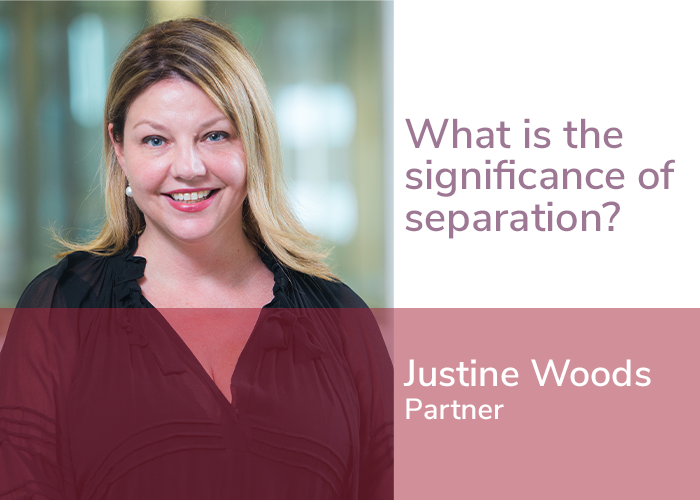Cooper Grace Ward has been announced as the winner of four categories in the latest Beaton Client Choice Awards: Best Australian Law Firm, Best Professional Services Firm, Most Innovative Law ...

In this video, CGW family law partner Justine Woods talks about the significance of the date of separation in a family law matter.
Hello, hello, everyone, I’m Justine Woods, I’m the family law partner at Cooper Grace Ward.
I wanted to expand on a topic that we have covered previously, and it relates to disclosure, but I thought I might take a more sensationalistic approach and talk to you about conspiracy theory, which is quite fascinating in a novel or in a movie, but it also features in family law matters often.
Now, it’s usually the primary job of the business spouse, and both parties might be business spouses, but commonly, their job is to provide disclosure to the other person, and it’s a big job and it can be very burdensome and there’s often a feeling of resentment about why do I have to provide all of these documents? And I just always say to my clients, because it is your job, firstly, so try not to complain, but also you are charged with the responsibility of making the other person understand what the assets and liabilities are and what the pool of assets available to be divided is actually comprised of and valued at. And I also say to people, the job that you have when you’re together is the job you’ll have post separation.
And so, if you have been the business spouse, just accept that you will continue to have to furnish that information. Enlist the assistance of accountants, personal assistants, friends, family members, if you can, to marshal all of that evidence. But just accept that it has to be provided, because sometimes there’s a perception on the other side, and perhaps it’s a genuine fact that there has not been the flow of information. There might be secretiveness or there might be assets concealed, for example. So, disclosure is intended to unravel that and if you genuinely are disclosing everything, then keep doing so, because once you completely defeat the other side’s argument that you’re failing to do so.
Where people encounter problems is if they say but I’ve already told them that that. We just run a family law matter like every other business negotiation. All the theory of which would say you need to proceed independently of trust. So, if someone says something to you, they must substantiate that with a document and just accept that that’s how it is. Now, sometimes on the other side, you’ll get a raft of, if I may say unkindly ridiculous inquiries about transactions that happened 20 years ago and can you produce this? Well, the answer sometimes, is no, we can’t. It’s not in our possession, power or control and sometimes I even shut down that argument at the stage of relevance. How is it relevant what the parties spent their money on in 2002? It’s just not going to be relevant in the ordinary matter of case. In the same way and people don’t like this advice necessarily either.
If people are meeting all of their financial and their legal obligations in terms of servicing liabilities, paying spousal maintenance or child support as applicable, what they do with their money is completely up to them. So the obsession I find with reviewing people’s expenditure and feeling terribly upset about that is not a useful and completely natural, but not a very useful application of your emotional energy, nor of your legal fees.
Now, sometimes disclosure and pouring over documents, indeed, in most matters is necessary. What we’re trying to do is capture the current value and composition of the pool and that means reading a lot of very tedious financial documents, but it has to be done. But overall, what you’re trying to do as either spouse is to say this is what we have, this is what there is to divide. These are the tracing exercises and make that the focus of your attention. And then naturally enough, that will dispel any conspiracy theories that have improperly arisen.
So, if you need help with unraveling that type of issue, please contact us at Cooper Grace Ward.
This publication is for information only and is not legal advice. You should obtain advice that is specific to your circumstances and not rely on this publication as legal advice. If there are any issues you would like us to advise you on arising from this publication, please let us know.
Subscribe to our interest lists to receive legal alerts, articles, event invitations and offers.

In this edition of It depends, family partner Justine Woods discusses whether you can safeguard an intergenerational family business from a family law claim. Video Transcript Hello. Hello, everyone. ...
Cooper Grace Ward acknowledges and pays respect to the past, present and future Traditional Custodians and Elders of this nation and the continuation of cultural, spiritual and educational practices of Aboriginal and Torres Strait Islander peoples.
Fast, accurate and flexible entities including companies, self-managed superannuation funds and trusts.